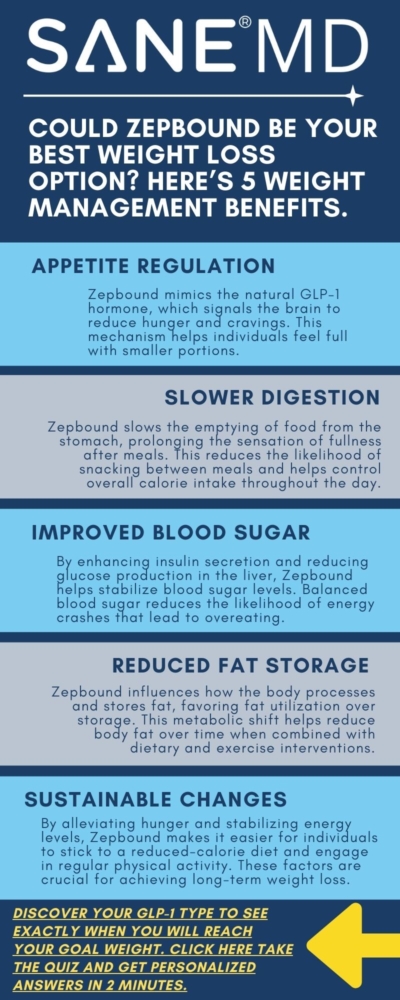Could Zepbound Be Your Best Weight Loss Option? Take the Quiz Now!
Dr. Matthew Olesiak, MD, is the Chief Medical Director at SANESolution, a renowned wellness technology company dedicated to providing evidence-based solutions for optimal living. Dr. Olesiak earned his medical degree from the prestigious Jagiellonian University Medical College in Kraków, Poland, where he developed a strong foundation in medicine.
Weight loss medications have become a valuable tool for individuals struggling to achieve and maintain a healthy weight. Among the latest options is Zepbound, developed by Eli Lilly, a prescription drug that uses the active ingredient tirzepatide to promote weight loss. Could Zepbound be your best weight loss option?
Eli Lilly’s commitment to addressing obesity through their Lilly Cardiometabolic Health initiative underscores its dedication to advancing treatments that manage obesity as a chronic disease. While the drug has shown impressive results in clinical trials, it may not be suitable for everyone.
To help readers explore whether Zepbound aligns with their weight management goals, a weight loss drug quiz is available. This tool can provide personalized insights into how Zepbound—or other medications—fits into an individual’s overall health and lifestyle.
Key Takeaways
- Dual-action mechanism: Zepbound is a GLP-1 and GIP agonist designed to regulate appetite and digestion.
- Proven results: Clinical trials indicate potential weight loss of up to 21% of body weight for some patients.
- Personalized guidance: A weight loss drug quiz helps evaluate individual weight loss needs and history.
What is Zepbound and How Does it Work?
Zepbound is a prescription medication containing tirzepatide, which is also the active ingredient in Mounjaro, a drug for type 2 diabetes.
Zepbound operates by activating two hormone receptors—GLP-1 (glucagon-like peptide-1) and GIP (glucose-dependent insulinotropic polypeptide)—that play crucial roles in appetite regulation and digestion.
- GLP-1 helps reduce appetite by acting on the brain’s hunger centers and slowing stomach emptying, promoting prolonged satiety.
- GIP enhances the effects of GLP-1 while also playing a role in improving metabolic functions.
Benefits of Zepbound for Weight Loss
Zepbound offers several compelling benefits for individuals struggling with weight loss.
Clinical trials have shown that Zepbound can lead to significant weight loss, with participants experiencing an average weight loss of 15.5% of their body weight in those with overweight or obesity without diabetes, and 14.9% in those with type 2 diabetes. This makes Zepbound a valuable tool in the fight against excess weight.
In addition to weight loss, Zepbound has been found to improve glycemic control and reduce the risk of major adverse cardiovascular events. This dual benefit is particularly valuable for individuals with type 2 diabetes or those at risk of heart disease.
Zepbound is also convenient and easy to use, requiring only a once-weekly injection. This can be a significant advantage for those who find daily medication regimens challenging. The most common side effects are mild to moderate gastrointestinal issues, such as nausea, diarrhea, and vomiting, which are generally manageable and tend to decrease over time.
Moreover, Zepbound has been shown to be effective in reducing body weight and improving weight-related health conditions, such as high blood pressure, type 2 diabetes, and heart disease. For individuals who have tried other weight loss medications without success, Zepbound offers a promising alternative.
Overall, Zepbound is a valuable addition to the range of obesity medications available, offering a safe and effective treatment option for a subset of individuals struggling with excess weight and related health conditions.
Zepbound vs. Other Obesity Medications
Is Zepbound the right fit for your weight loss plan? It depends. Weight loss medications differ in their mechanisms and outcomes.
Here’s how Zepbound compares as part of the expanding options for obesity treatment:
- Wegovy vs. Zepbound: While Wegovy targets only GLP-1 receptors, Zepbound activates both GLP-1 and GIP receptors, potentially enhancing satiety and weight loss.
- Mounjaro vs. Zepbound: Both drugs contain tirzepatide, but Mounjaro is approved for diabetes, whereas Zepbound focuses on obesity management.
- Ozempic vs. Wegovy: These are essentially the same drug but marketed for different conditions, with varying doses.
Understanding these differences can help users, especially those who take the Zepbound quiz, make informed decisions about which medication aligns with their health goals.
Average Weight Loss Results with Zepbound
Clinical trials for Zepbound demonstrated significant results in helping participants lose weight:
- Participants without diabetes experienced an average weight loss of 18% of their body weight when administered the highest dose
- In some cases, weight loss reached up to 21%, underscoring Zepbound’s potential for long-term management.
However, outcomes can vary based on individual factors, including body composition, initial weight, and adherence to lifestyle changes like a reduced-calorie diet and regular physical activity. The weight loss drug quiz evaluates such factors to offer personalized recommendations.
Eligibility and Contraindications for Severe Gastrointestinal Disease
Zepbound is approved for adults aged 18 and older who meet specific criteria:
- A BMI of 30 or higher or a BMI of 27 or higher with at least one weight-related condition (e.g., hypertension or type 2 diabetes).
- Contraindications include pregnancy, a personal or family history of medullary thyroid cancer, and severe gastrointestinal conditions.
Consulting with a healthcare provider is essential, and taking the weight loss drug quiz can provide valuable insights, too. It’s important to note that Zepbound and gut health are not mutually exclusive. In fact, studies indicate that Zepbound can support gut health.
Is Zepbound Right for You?
How does Zepbound stack up for your weight loss needs? Determining if Zepbound is the right weight loss medication for you involves considering several factors.
Here are some key points to help you decide:
- Body Mass Index (BMI): Zepbound is approved for adults with a BMI of 30 or higher, or those with a BMI of 27 or higher who have at least one weight-related health condition, such as high blood pressure, type 2 diabetes, or heart disease.
- Weight Loss History: If you have tried other weight loss medications or programs without success, Zepbound may be a viable option. Its unique dual-action mechanism could offer the results you’ve been seeking.
- Health Status: Zepbound is not recommended for individuals with a history of severe gastrointestinal disease, pancreatitis, or thyroid cancer. Additionally, it should not be used in combination with certain medications, such as birth control pills or diabetes medicines.
- Lifestyle Habits: To maximize the effectiveness of Zepbound, it is essential to combine it with a reduced-calorie diet and regular physical activity. These lifestyle changes are crucial for achieving and maintaining weight loss.
If you meet these criteria and are interested in taking Zepbound for weight loss, consult with your healthcare provider to discuss the potential benefits and risks of treatment.
They will help determine if Zepbound is right for you and develop a personalized treatment plan to support your weight loss journey.
It is essential to note that Zepbound is a prescription medication and should only be used under the guidance of a healthcare professional.
Additionally, it is crucial to carefully follow the recommended dosage and administration instructions to minimize the risk of side effects and ensure optimal treatment outcomes.
Safety and Side Effects
All medications carry potential side effects, and Zepbound is no exception.
Common side effects include:
- Nausea, vomiting, diarrhea, and constipation.
- Stomach pain, indigestion, and injection site reactions.
Serious side effects to be aware of include:
- Gallbladder problems.
- Kidney issues.
- Potential risk of thyroid tumors.
Patients should inform their doctors about all medications, supplements, and health conditions before starting Zepbound.
Cost and Accessibility
With a list price exceeding $1,000 per month, Zepbound can be a costly option. However, LillyDirect offers discounts of 50% or more for eligible patients with valid prescriptions.
When exploring options, affordability is a key factor.
Realistic Expectations for Weight Loss with Zepbound
No weight loss drug is a magic solution. Zepbound works best when paired with:
- A healthy, reduced-calorie diet to support caloric deficit.
- Consistent exercise to enhance overall health and maintain weight loss.
Patients should also recognize that long-term use may be necessary to prevent weight regain. Understanding these realities is essential for setting achievable goals.
Precautions and Warnings
Before starting Zepbound, patients should:
- Consult their doctor to determine its suitability based on personal medical history.
- Remember that Zepbound is not a substitute for lifestyle changes like diet and exercise.
Frequently Asked Questions (FAQ) About Zepbound
Zepbound is a weight loss medication with a unique mechanism targeting both GLP-1 and GIP hormone receptors. Understanding its use, safety, and effectiveness can help individuals decide if it’s the right option for their weight loss journey.
Below are answers to common questions about Zepbound.
1. What is Zepbound, and how does it work?
Zepbound is a prescription weight loss medication that contains tirzepatide, a drug designed to regulate appetite and digestion. It activates two key hormone receptors—GLP-1 and GIP—to reduce hunger, slow stomach emptying, and promote satiety.
This dual mechanism makes Zepbound highly effective for weight loss when combined with lifestyle changes like diet and exercise.
2. How does Zepbound compare to other weight loss drugs?
Zepbound differs from other drugs like Wegovy or Ozempic by targeting two hormone receptors instead of one, potentially enhancing weight loss results. While drugs like Orlistat focus on blocking fat absorption, Zepbound works by controlling appetite and food intake.
These differences mean that Zepbound may be more effective for individuals who struggle with hunger and portion control.
3. What are the common side effects of Zepbound?
Common side effects of Zepbound include nausea, vomiting, diarrhea, and constipation, particularly when starting treatment or increasing the dose. Some users also experience abdominal discomfort, fatigue, and injection site reactions.
While these side effects are often mild, it’s essential to discuss them with your healthcare provider if they persist or worsen.
4. Who is eligible for Zepbound?
Zepbound is approved for adults with a BMI of 30 or higher or those with a BMI of 27 or higher and at least one weight-related condition, such as hypertension or type 2 diabetes. However, it is not recommended for individuals who are pregnant, have a history of thyroid cancer, or have severe gastrointestinal conditions.
Consulting with a healthcare provider is essential to determine eligibility and safety.
5. Can Zepbound be used long-term?
Zepbound is often prescribed as part of a long-term weight management strategy. Studies indicate that continued use may be necessary to maintain weight loss and prevent weight regain.
However, its long-term use should always be monitored by a healthcare provider to ensure safety and effectiveness over time.
Conclusion
Zepbound is a promising addition to the growing list of weight loss medications, showing exceptional results in clinical trials. However, its effectiveness depends on lifestyle changes and long-term use.
For individuals exploring their options, consulting a healthcare provider and using tools like the weight loss drug quiz can provide personalized guidance. Sustainable weight loss requires commitment, realistic expectations, and professional support to achieve lasting results.





